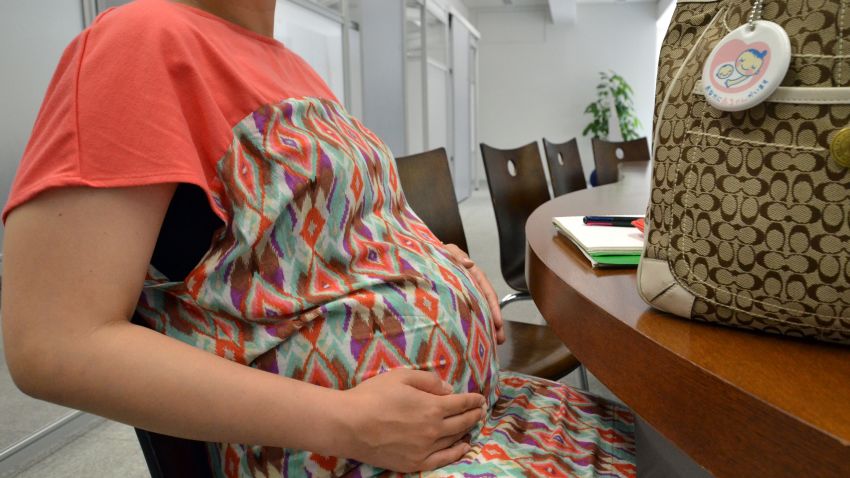Pregnancy complications linked to increased risk of early death even decades later, study finds

The study, published Monday in the journal JAMA Internal Medicine, found that women who experienced major complications during pregnancy had an increased risk of early death and that risk remained elevated for more than 40 years.
“Adverse pregnancy outcomes may lead to small physiologic changes that are initially hard to detect, such as inflammation or other abnormalities in small blood vessels. These changes may persist or progress after pregnancy, eventually leading to other health problems that may take years or even decades to appear,” Dr. Casey Crump, an author of the study and professor in the department of family medicine and community health at UTHealth Houston, said in an email.
“Pregnancy provides a key opportunity to identify high-risk women and start interventions earlier in life, before other health problems develop,” Crump said. “Women who experience adverse pregnancy outcomes need close follow-up with their primary care doctor, starting soon after delivery, for regular preventive care to help reduce these risks and protect their long-term health.”
Nearly 30 percent of women experience an adverse pregnancy outcome during their reproductive years, the researchers wrote in their study.
‘An early window to health in later life’
The researchers, from The University of Texas Health Science Center in Houston and Lund University in Malmö, Sweden, analyzed data on more than 2 million women who gave birth in Sweden between 1973 and 2015.
“This study was conducted in Sweden because its universal health care system collects nationwide data that enabled several decades of follow-up,” Crump said in the email. He added that the study “will eventually need to be replicated in other populations, including the US where minority groups may potentially have even higher risks than we found in Sweden.”
The researchers took a close look at how many of the women in the data experienced any of five major pregnancy complications: gestational diabetes, preterm delivery, having infants with a low birth weight, preeclampsia and other disorders related to high blood pressure. They also examined for how long the women lived after giving birth. The data showed that more than 88,000 women had died and all five pregnancy complications were independently associated with a higher mortality risk later in life.
The new study “sheds light on an evolving area – the association of pregnancy complications with long term health risks,” Dr. Ashley Roman, vice chair for clinical affairs and chief of obstetrics at NYU Langone Health, who was not involved in the study, said in an email.
“It is not so much that pregnancy causes or directly increases the risk of these long term complications. The way I explain this to my patients is that pregnancy is a stress test that can unearth a predisposition to certain diseases later in life,” Roman said. “A pregnancy is supported by the placenta, which creates hormones and needs a rich blood supply to do its job right. How the mother’s body responds to these hormones and vasculature created by the placenta is an early window to health in later life.”
‘It was striking… more than 40 years after’
Women who experienced any of the five pregnancy complications had up to a 1.5-fold increased risk of death up to 46 years after delivery, the researchers found, and those who experienced multiple complications had further increases in risk.
Gestational diabetes was associated with a 52 percent increased risk of mortality, preterm delivery was associated with a 41 percent increased risk, delivering a baby with low birth weight was associated with a 30 percent increased risk, preeclampsia with a 13 percent increased risk and other hypertensive disorders with a 27 percent increased risk, the data showed.
“It was striking that all five major adverse pregnancy outcomes were linked with increased mortality risks even more than 40 years after delivery,” Crump said in the email.
“We found that the increased mortality was attributable to multiple different causes of death, including heart disease, diabetes, respiratory disorders, and cancer,” he said. “This suggests that there are multiple different underlying pathways that will need additional research to further identify.”
All five pregnancy complications were linked with up to a 2.5-fold increased risk of dying from cardiovascular disease compared with women who didn’t have adverse pregnancy outcomes, the data showed.
Women with either preterm deliveries or who delivered infants with a low birth weight had more than a 2-fold higher risk of dying from respiratory-related causes and up to a 1.2-fold increased risk of dying from cancer.
The risk of dying due to diabetes was more than 2-fold higher in women with preterm deliveries or preeclampsia and 25-fold higher in those with gestational diabetes, the researchers found.
‘The largest study to date’
As for how long these increased risks last after giving birth, the association between preterm delivery and increased mortality risk was highest in the first decade after giving birth and then subsequently declined, the study showed, but the associations between other pregnancy complications and increased mortality risk remained stable or increased with time.
“To our knowledge, this is the largest study to date to examine multiple adverse pregnancy outcomes in the same cohort in relation to long-term mortality and the first to assess for potential unmeasured familial confounding,” the researchers wrote, adding that their findings were not explained by a woman’s family health history.
In a separate study, Crump and his colleagues previously found that complications during pregnancy can be linked to a higher risk of heart disease, the leading cause of death in the United States.
Overall, it has been “well known” that certain pregnancy complications are associated with an increased risk of cardiovascular disease and metabolic disease later in life, said Dr. Joanne Stone, professor and system chair of the Raquel and Jaime Gilinski Department of Obstetrics, Gynecology and Reproductive Science at the Icahn School of Medicine at Mount Sinai, who was not involved in the new study.
Now, the study “really solidifies what has been known,” Stone said.
“This adds incredibly important information to a woman’s overall medical history, because a lot of patients don’t remember to include that medical history with physicians and an internist may not ask questions about complications in your pregnancies. But this really highlights how important that is,” she said. “Maternal pregnancy history is an important part of a woman’s overall medical history, and highlights that women who have experienced such adverse pregnancy outcomes should have early prevention and early detection to prevent premature deaths.”
The new study did not include data on other factors that may impact a woman’s overall health, such as diet or exercise, but it’s well-known that a healthy lifestyle – such as eating healthy, maintaining a healthy weight, not smoking and limiting alcohol – can lower the risk of pregnancy complications, as well as getting adequate health care before, during and after pregnancy.
“Many of these – preeclampsia, hypertension, diabetes – can be associated with obesity, for example. So, getting the weight under control, being healthy, exercising better, having a healthy lifestyle that certainly can help,” Stone said. “There’s a lot of lifestyle interventions that can be done to improve health going into the pregnancy.”
The post Pregnancy complications linked to increased risk of early death even decades later, study finds appeared first on Egypt Independent.
What's Your Reaction?
 Like
0
Like
0
 Dislike
0
Dislike
0
 Love
0
Love
0
 Funny
0
Funny
0
 Angry
0
Angry
0
 Sad
0
Sad
0
 Wow
0
Wow
0



















































